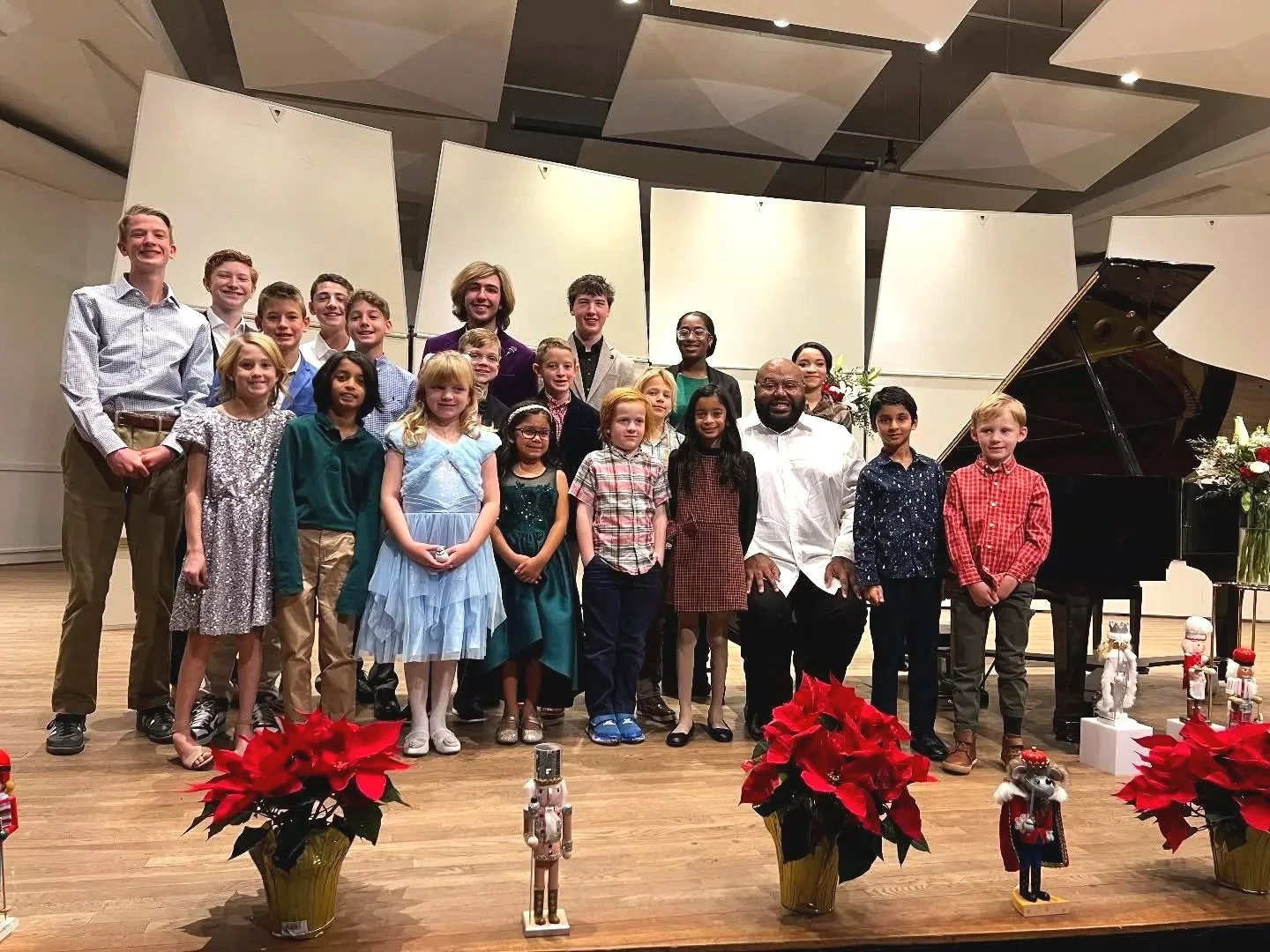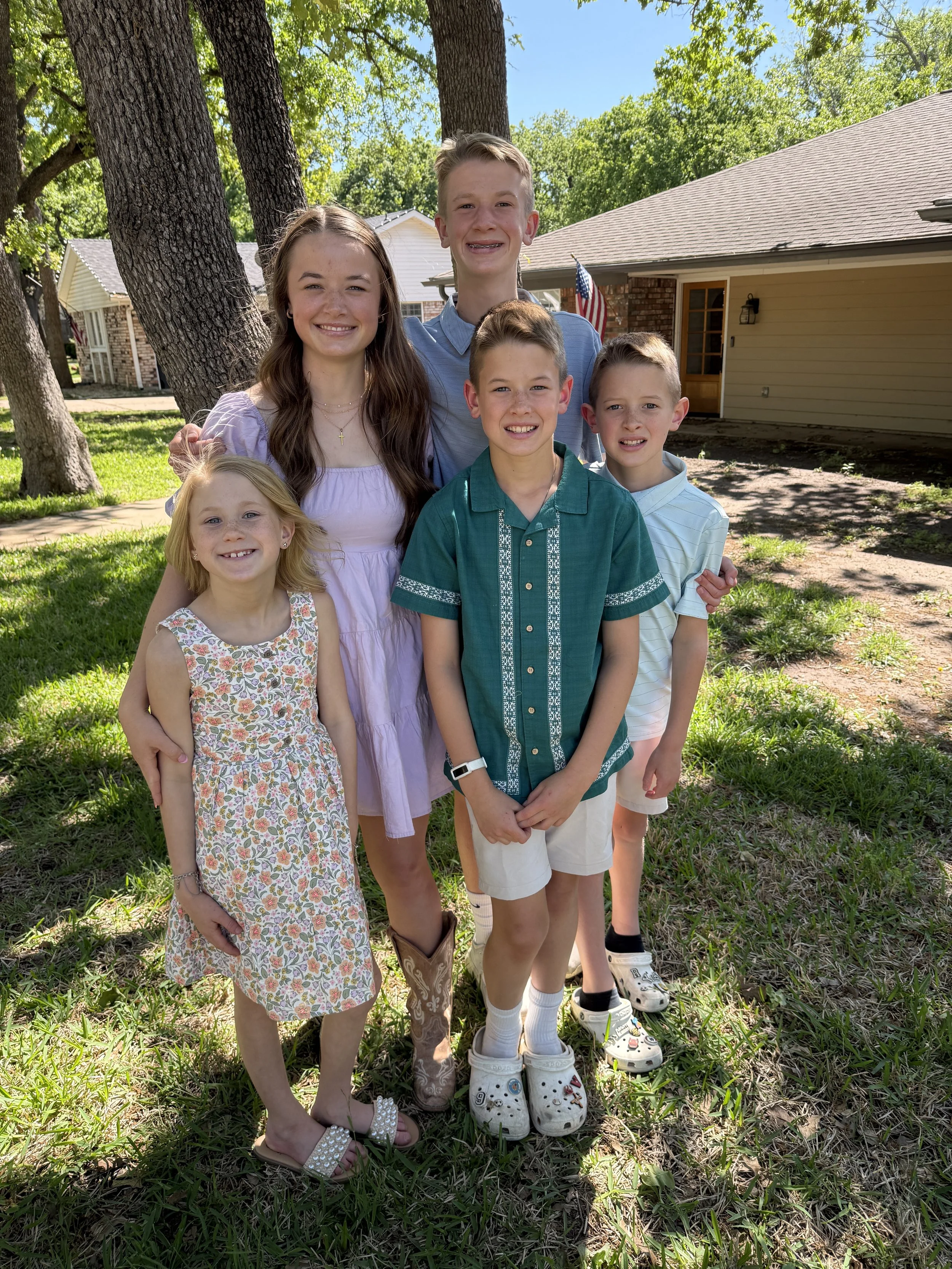Welcome to…
The Warren Piano Studio
Spring Recital (2025)
Winter Recital (2024)
“I look forward to exploring the world of music with you…” — Lewis Warren, Jr.
B.M. NEC | M.M. CCM | P.D. SMU
With over a decade of experience teaching private piano in both the Boston and Dallas–Fort Worth areas— as well as internationally— Mr. Warren is known for his nurturing, individualized approach which consistently inspires meaningful and musical growth in his students.- Testimonials & FAQs are below -
Winter Recital (2025)
Spring Recital (2024)
Winter Recital (2023)
- T e s t i m o n i a l s -
FAQs
-
Children can typically begin piano lessons around the ages of 5 to 6. This age is ideal, as it allows for the focus and attention needed for a lesson, which usually lasts at least 30 minutes. However, I have found that some children as young as 3 or 4 can engage effectively for 20 to 45 minutes, depending on their interest and commitment, as well as parental support. I recommend scheduling a trial lesson to assess your child’s readiness and enthusiasm for learning.
-
Why absolutely! There is no age limit to learning the piano, and it's never too late to start your musical journey. I would love to discuss your goals and help you achieve them. While I typically offer bi-weekly lessons to accommodate adult learners' busy schedules, I highly encourage weekly lessons for more consistent progress. Let's make your musical aspirations a reality!
-
The choice of instrument largely depends on the student’s musical goals, dedication, and budget. Ideally, a brand new Yamaha or Steinway baby grand piano is a wonderful investment, as these instruments excel at all levels of proficiency.
However, upright pianos serve as excellent practice instruments and are typically more budget-friendly, taking up less space than baby grands. If considering a used piano (grand or upright), ensure it’s in good condition, with minimal wear, functioning keys, and intact pedals.
Electric keyboards can also be a viable option, provided they have 88 keys, weighted action, functioning pedals, and high-quality piano sounds. Some keyboards even replicate grand pianos and the acoustics/action are quite realistic.
A ballpark price range is anywhere from $300-$5k on the lower end. Feel free to email me if you’d like to discuss specific brands and options tailored to your needs!
-
While the saying goes, "Practice makes perfect," it's actually perfect practice that leads to optimal results. So, how can one practice effectively?
In today’s fast-paced world, children often face more distractions and extracurricular commitments than previous generations. Therefore, I recommend the following practice guidelines:
For beginner and early intermediate students: 15 minutes to 1 hour daily can yield significant progress if practice is consistent, focused, and performed every day.
For late intermediate to early advanced students: A minimum of 30 minutes to 2 hours each day is ideal, depending on the repertoire and its complexity.
For advanced and professional students: Aim for at least 3 to 4 hours daily, especially for those preparing for competitions.
Although it may seem sacrilegious, I personally emphasize the importance of qualitative practice over quantitative. A focused 30 to 60 minutes of practice can be far more effective than several hours of distracted playing. Each student is different, so it’s essential to discover methods and sources of inspiration that foster productive practice sessions.
I also understand that busy schedules can pose challenges, particularly with sports events and school commitments. However, committing to piano as a discipline requires effort and dedication from both the student and, when applicable, the parents. I aim to give music that is feasible to learn while also rising in proficiency. Thus, consistent and focused practice is the key to success
-
I specialize in teaching classical piano, drawing on techniques from the Russian School, Suzuki Method, Traditional Training, and music theory. My instruction is informed by training from esteemed professors at institutions such as the New England Conservatory, Cincinnati Conservatory of Music, and Southern Methodist University, as well as numerous masterclasses conducted by renowned pianists.
Once a student has mastered foundational techniques—such as reading music, playing scales, and learning independently—we can explore more personal musical goals, including improvisation, jazz, pop music, or continued classical study.
My teaching philosophy centers on positive reinforcement while maintaining a friendly yet professional demeanor, combining focus with a moderate level of strictness. I believe in nurturing each student's unique qualities and fostering their musical expression.
Recognizing that every student is different, I tailor my approach to meet individual needs. My ultimate goal is to create a supportive environment that encourages musical growth, self-confidence, and personal expression. As long as we uphold mutual respect, I am confident that our collaboration will be fruitful and enjoyable.
-
Competitions provide valuable exposure for students in a public and professional setting, serving as excellent opportunities to set musical goals and challenges that foster growth in practice and technique. Winning a grand prize not only enhances a resume but also builds self-confidence. And while winning is great, ultimately, it is the overarching experience of personal growth and achieving a goal that should matter most.
That said, I believe that participation in competitions is most beneficial for students who demonstrate a strong ability to perform at their age and level, characterized by:
Consistent, focused, and efficient practice (ideally a minimum of 2 hours per day).
Significant progress in technique, sight-reading, memorization, and musicality (the ability to learn music independently with minimal guidance).
A solid understanding of music theory.
The capacity to perform with emotional depth and confidence.
If these criteria are not met, I may advise against pursuing competitions, as the level of performance required is extremely high, even for late beginners.
However, if piano is a priority over other activities, such as sports, and your child demonstrates both interest and talent, as well as a willingness to engage with the competitive culture, we can certainly discuss the possibility of entering competitions. My goal is to showcase the best version of each student, which requires time, experience, and a deep commitment from all involved—parents, teachers, and students alike.
-
Yes, there are fantastic performance opportunities for students! Each year, I host two main recitals: a Winter recital in December and a Spring recital in May. These events serve as celebratory moments for students to showcase the hard work and progress they have made throughout the semester.
Family and friends are warmly invited to attend, creating a supportive atmosphere where students can perform for their loved ones and gain valuable experience in front of an audience. The recitals not only highlight individual achievements but also foster a sense of community among students and their families.
In addition to these recitals, I may offer other informal performance opportunities throughout the year, such as masterclasses, community events, or collaborative sessions with fellow musicians. These experiences contribute to building confidence, enhancing performance skills, and deepening the students’ appreciation for music. Participating in performances is an integral part of the learning journey, and (if well prepared) I encourage all students to take advantage of these opportunities to express themselves musically!
-
Yes, I currently travel to the student's home for lessons. Until I am able to host lessons in a dedicated professional space, I prioritize providing convenient, in-home instruction. This allows me to create a comfortable and personalized learning environment for each student.
-
Currently my lesson fees are:
Trial Lesson - $60 flat rate
Hour lesson - $90
45 min lesson- $70
30min lesson - $50
When on contract, these can be paid monthly.
-
I aim to offer 42 weeks of lessons throughout the year: 17 weeks in the fall (Aug-Dec), 17 weeks in the spring (Jan-May), and 8 weeks in the summer (May-Aug). The 3:45 PM time slot, available Monday through Friday, is highly coveted and tends to fill quickly, so I recommend considering multiple days and times that could work for you.
I also continue teaching during the summer, as my studio is less crowded due to vacations, providing an excellent opportunity for focused learning and progress. Many students find that summer lessons allow them to explore new repertoire and refine their skills in a typically more relaxed environment.
While some lessons may be canceled or rescheduled due to my concerts, travel, or illness (or for external circumstances on the students’ end) , I encourage open communication to find convenient alternatives for rescheduling.










